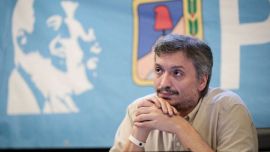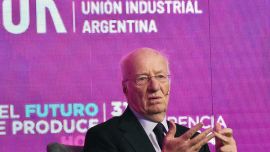Diego Santilli, the deputy mayor of Buenos Aires City, says that the time has come for those in the “lower leagues” of Juntos por el Cambio to play “in the first division.” He believes that his coalition should affirm itself far from any extremes as a matter of identity.
Santilli sees the moderate elements within the government as turning very Kirchnerite of late, says he was "shocked" by the body-bags protest in the Plaza de Mayo and does not rule out progressives like Margarita Stolbizer or libertarians like Javier Milei and José Luis Espert joining up.
Is the electoral year beginning with a fresh emergence of polarisation?
That’s what we’re seeing. Cristina has placed herself in centre-stage. Until [the attempt to expropriate] Vicentin, Alberto [Fernández], the president, had established a constructive relationship with all the governors from different political parties. One example of that would be the tripartite press conferences [to address the management of the pandemic]. He used to speak of an inclusive country with all its leaders onboard, trying to resolve its structural problems. That was the profile. As from mid-2020 the vice-president started to hog the scene and they’ve begun this electoral year coming on much stronger with the onslaught against the courts. The annual state-of-the-nation speech on March 1 was addressed to only one sector, their own, as if unifying their sector meant advancing against the judicial branch, one of the three elements in the separation of powers in our republic. That’s opening wide the grieta chasm.
After the inauguration of ordinary sessions in the City Legislature, you posted on your Twitter account: “The grieta is [good] business for politicians”. What did you mean by business?
That it pays off, election year after election year, but then is useless for resolving the underlying problems.
Barack Obama used to say: “It’s very easy to win elections by polarising but then very diffícult to govern.”
It is indeed easy to win an election with fanatical positions to see who draws the most adherents but to govern you have to pass laws and transform. Our country has had structural problems for decades. It’s much more difficult without prior consensus.
In this ongoing series of interviews San Isidro Mayor Gustavo Posse said: “The attitude of Radicalism during the Cambiemos government was servile.” How would you see Radicalism during Mauricio Macri’s government?
With a very responsible attitude. Prior to the Mauricio Macri government Argentine democracy recovered a two-party system via coalitions. [Elisa] ‘Lilita’ Carrió’s Civic Coalition also formed part. Ernesto Sanz played a central role here, teaming up Radicalism nationwide with Mauricio Macri’s PRO. This set up a two-party system, thus starting political alternation among stronger, growing and more sustainable parties. The coalition had its work cut out consolidating structural issues which we needed to reform. That’s where the debate comes in and continues. It’s like that in all coalitions worldwide.
What will be its role in the future?
The coalition must be strengthened. It needs top-level representation in the executive and legislative branches.
Would that mean more equivalence in the specific weights between PRO and Radicalism?
We have to strengthen their presence in all the coalition.
How do you view the future of Martín Lousteau?
As very important. Martín is part of a generation which has been working with us in the City of Buenos Aires, part of our government.
Will he be Juntos por el Cambio’s next mayoral candidate?
We shouldn’t run ahead with any candidacy. What I do feel is that together with ‘Lilita,’ Martín, Horacio [Rodríguez Larreta], María Eugenia [Vidal] and a whole bunch of other leaders, we form part of a generation.
They say that you’ll move over to Buenos Aires Province while Vidal returns to the City.
They say so many things!
Is it true?
What is true is that I can no longer run for mayor. When Horacio asked me to be his running-mate for a second time, I knew that I was burying one of my aspirations after a learning process of many years – to head a government like the one we have now.
You could be mayor in 2027.
The years roll by and affect us all. But everything remains open.
Do you rule out continuing your career in the Province?
I don’t rule out anything per se, anything can be possible. At this stage in the opposition we have to contribute towards constructing an alternative which permits us to return in 2023.
But 2021 comes first. Could Vidal contribute more in the City than in the Province?
Vidal is a versatile all-rounder who performs well in the provincial, municipal and national spheres. She’s part of an important project headed by Horacio. In 2021 we have to have the best candidates to win seats.
Do you see her in the Province?
She’d have to tell you that. What I can say is that we have to play our best candidates in every district in order to keep adding seats to sustain our project of an alternative for 2023.
Miguel Ángel Pichetto has launched a Republican Peronism. You originate from that political identity. Could Peronism give Juntos por el Cambio its fourth leg?
Yes. When we began our project in this city in 2003, we called ourselves Compromiso para el Cambio [“Commitment to Change”]. We won the first round but missed out on an absolute majority in the run-off. Since then we’ve grown and grown, picking up Confianza Pública, the Civic Coalition, the Radicals and Roy Cortina’s socialists on the way – all of which broadened our base. What Miguel Ángel Pichetto is doing is great. There are many Peronists who could join up in respect for our identity as part of PRO’s founding coalition.
Would incorporating libertarians also be good?
Of course. We have to embrace the whole centrist front. I have a very centrist vision. It’s like spreading the wings of an aeroplane and building a government alternative which can construct a possible majority.
Could José Luis Espert and Javier Milei cannibalise part of the Juntos por el Cambio electorate?
They’re picking up experience. It’s valid that they should go their own way. The people will tell them. Votes do not belong to the leaders, they belong to the people.
But wouldn’t it bother you if they joined Juntos por el Cambio at some future point?
We believe in adding continually. We’d have to sit down and view our stances.
Would you feel more comfortable if Juntos por el Cambio incorporated Margarita Stolbizer or Facundo Manes?
I don’t know if I’d feel more comfortable. We’ve spent many hours in dialogue with both Manes and Margarita, as well as different sectors – we have to sit down with the other sectors. It’s good that the libertarians want to try their hand with their own experience of midterm elections. You should never close any doors – somebody might always have a good idea. What I don’t like is extremism, which leads us to anti-democratic situations.
Could Espert be in that position?
No. What I don’t like is things like the body-bags – unsustainable in a country which needs to emerge.
What is Juntos por el Cambio ideologically? In one of these interviews, Juan José Sebreli said that Mauricio Macri was a left-wing liberal. You have underlined that you would include progressives like Margarita Stolbizer, the Santa Fe socialists and even the libertarians. When Macri began his career, he had Ricardo López Murphy as his ally. What’s the difference with Peronism?
It’s a centrist coalition with a vision of Argentina’s future, instead of looking back at the past.
What differentiates one from the other? Is the difference aesthetic? Instead of Carlos Menem and Néstor Kirchner in Peronism, you can bring a progressive and libertarian to the table.
We can be visionary and reflexive from a right-wing perspective and from a centrist. This is a centrist coalition. We must see which vision looks more ahead.
Stolbizer and the Socialist Party could be considered centre-left.
As is the Civic Coalition while the Radicals also have their progressive wing.
Juntos por el Cambio has a diversity ranging from the centre-left to the right while Peronism has a broader diversity from the extreme left to the extreme right. Is that correct?
Juan Perón said that everybody is Peronist, whether left or right. But I note one difference – extremes do not lead anywhere.
Would keeping your distance from the extremes be the big difference?
We try to steer down that road.
How would you define yourself ideologically?
In the middle.
And Horacio Rodriguez Larreta?
In the middle.
And María Eugenia Vidal too?
Of course.
Are Mauricio Macri and Patricia Bullrich more to the right?
Mauricio Macri is the one who started all this process many years ago. He has a clear vision of reaching power from the centre, not from the right.
Is the real Macri to the right of Horacio, Vidal and you?
No, he’s not on the right any more. He takes a firmer stand on some issues than others but he’s not on the right any more. He continues to be a man who spreads both wings.
When the Frente de Todos was formed, it ran the election-winning slogan of “We’re returning improved.” What would be “returning improved” for Juntos por el Cambio?
Maintaining what we did well, which was integrating the country into the world while strengthening regional economies and federalism.
And what remains to be improved?
Something which no president could do in the young history of our country – resolve the structural economic problems. We’ve been through dollar futures, inflation, [manipulating] the value of the exchange rate. We never end up understanding what the problems are nor how we Argentines can save. We save in dollars, that’s the first problem. We have to produce and export more to earn foreign currency. We must create jobs.
You said: “In Costa Salguero we’re developing the city, creating a new neighbourhood with green spaces.” But environmentalist sectors object.
The same happened with previous City projects. Puerto Madero, 25 years ago, was an area of obsolete shipping and dockyards where people had no access, without parks or housing. Today it’s the newest neighbourhood in the city – 65 percent public spaces, 35 percent housing, a view of the river and accessible to people who can choose to live there or spend some pleasant moments.
Let’s fast forward to 2010. I studied in the Drago building of Buenos Aires University, the result of Osvaldo Cacciatore expropriating houses occupied by squatters. We picked up a Civic Coalition project. Today it must be one of the nicest neighbourhoods in Buenos Aires. You should tour it. One part is still pending but up to Avenida General Paz it’s beautiful, exemplary. That’s what we’ve been doing in the City of Buenos Aires with places to which society had no access. Moving a bit closer, to the Park of Innovations, we’ve worked on the Federal Shooting Range. It will be a city neighbourhood with universities and knowledge and creative industries. The City of Buenos Aires is worth looking after...
Why are environmentalists so critical?
What kind of free access to Costa Salguero does society have today or what view of the river? None. Costa Salguero is a lease. It will have three developed hectares and 11 of green spaces which it lacks today. It currently has an exhibition hall but no green spaces. This is integrating town planning, ecology, parks and green spaces to a new place in the city and giving it life. We’ve worked very hard to recover the coastline. City Hall needs to continue offering a view of the river. That’s the aim, no other.
What happened with crime as from 2018 when recession set in?
That’s a very interesting question. Looking back over the crises in Argentina, the crime rate has risen in every one of them. But the murder rate in Buenos Aires has gone down from 7.26 per 100,000 inhabitants to 4.02 – the second-lowest murder rate in the American continent for a national or regional capital.
Who’s first?
Quebec City in Canada. Santiago is not far above us (5.1) and nor is Uruguay. We’ve constructed an integral system of security proceeding from education.
Has it got worse since 2017?
It even went down further until 2019, which was the best year, 3.36, and grew again last year. There are two central points of focus behind the rise. One is Zavaleta 21/24 where drug-traffickers began a mutual vendetta between their sectors, doubling the cases in that zone. In the rest of the city, it kept going down. Then there were situations arising out of the pandemic, perhaps psychiatric problems, but they remain homicides at the end of the day. Street people knifing each other.
Never due to economic deterioration?
There are vendettas among criminals which we did not see last year. When you look at the statistics for the crisis years after 2001, 2002, 2003 and 2004 went from bad to worse. Following the subprime crisis as from 2009 crime rose in the city between 2010 and 2012. The year 2019 was the best in the last 25. Last year, even with the pandemic, was much better than 2019 with crime 50 percent down, save the homicides. It is more volatile this year but still below last year. Those are the numbers which I look at every week. The precinct chiefs are accountable to me every week, crime for crime, neighbourhood for neighbourhood, situation for situation.
Miguel Ángel Pichetto also said in this series of interviews that he saw La Cámpora becoming progressively more social democratic. Will the youngsters of La Cámpora, who are not so young anymore, turn into democrats and republicans when they reach 50?
That’s the story of politics. You arrive with an ideal, from Franklin Roosevelt to Carlos Menem, and then you see. A great Argentine leader said: “Politics is like the violin, you grab it with your left hand and play with your right.” That was Juan Perón. You go moving to the centre in proportion to your responsibilities. When I see the extreme expressions of some sectors, I don’t know if I’m altogether clear as to what Miguel is talking about.
Is that what happened to PRO, starting on the right and lurching towards the centre?
It arrived from the centre.
But beforehand?
Yes, it went full circle. Compromiso para el Cambio kicked off with the PJ (Peronism). Cristian Ritondo and I were the pioneers.
The PJ was different at the end of the last century, closer to the centre-right Ucedé, of which Sergio Massa was a member.
Perhaps.
Sergio Massa is friendly with Horacio Rodríguez Larreta. Are there people in Frente de Todos who could ideologically be in Juntos por el Cambio?
There are centrists. That was what Alberto Fernández represented when he reached the presidency or Sergio Massa as Chamber of Deputies Speaker. The problem is that they have turned into Kirchnerites and cannot return to the centre.
Do you see Macri as a candidate in 2023?
That’s a question you’d have to ask him. He’ll have to define that, as he has all the right in the world to do.
Could he?
I’d like to see Horacio Rodríguez Larreta as our presidential candidate.
Is there a tussle among Macri’s supporters between hardline and more moderate sectors in which Horacio would be the ‘primus inter pares [“first among equals”]’?
Such differing stances are logical within a coalition as open as ours. They are valid expressions which will have to be sorted out by the presidential primary in 2023.
Those positions represent very deep structures. You’re the son of Hugo Santilli, the president of River Plate between 1983 and 1989 during the presidency of Raúl Alfonsín and Banco Nación president between 1989 and 1991 with Carlos Menem. You started in Peronism after studying in a parochial religious middle-class school and the state university system. Did you feel, like Emilio Monzó, that the products of Cardenal Newman looked down on you?
They always received me very well, I cannot complain. I learned a lot. Macri added the value of management to politics. I don’t believe in the two extremes of going over the top and technocracy. It’s a combo. Politics is the art of making the impossible possible and for that you have to have a vision, an idea. Amd management to push it through because vision is not enough. The best of us was on display in our first eight months in the City. There was an integrated line followed by Vidal, Mauricio, Horacio and many others such as Gabriela Michetti and myself. That gave us a balance between management, politics and vision.
Doesn’t Mauricio Macri desire to recover specific weight?
He has all the right in the world, as do we.
Would he enter a primary in order to win it?
As the leader and founder of the space he created, he has all the right in the world. And we who come from the lower leagues have every right to occupy that place. My idea of a candidate is somebody like Horacio, a hands-on leader who is a transformer and has a vision of the country and city. He works and builds every day.


























Comments